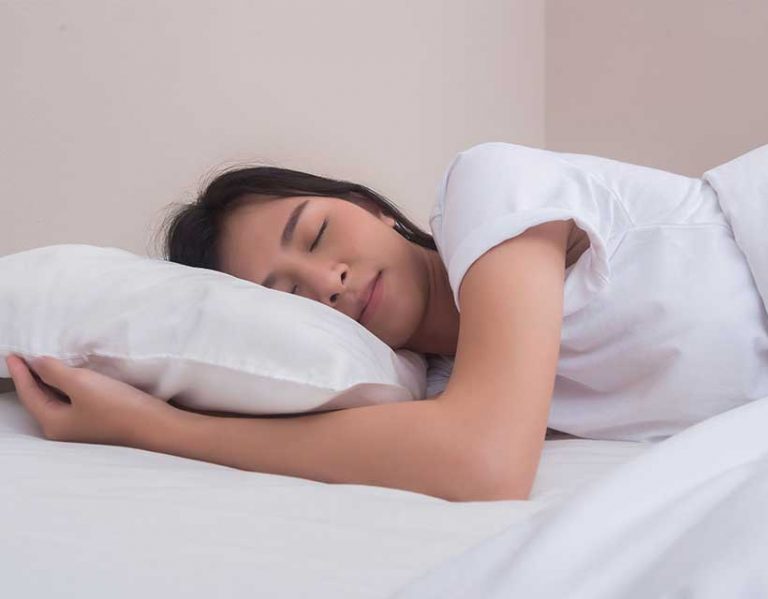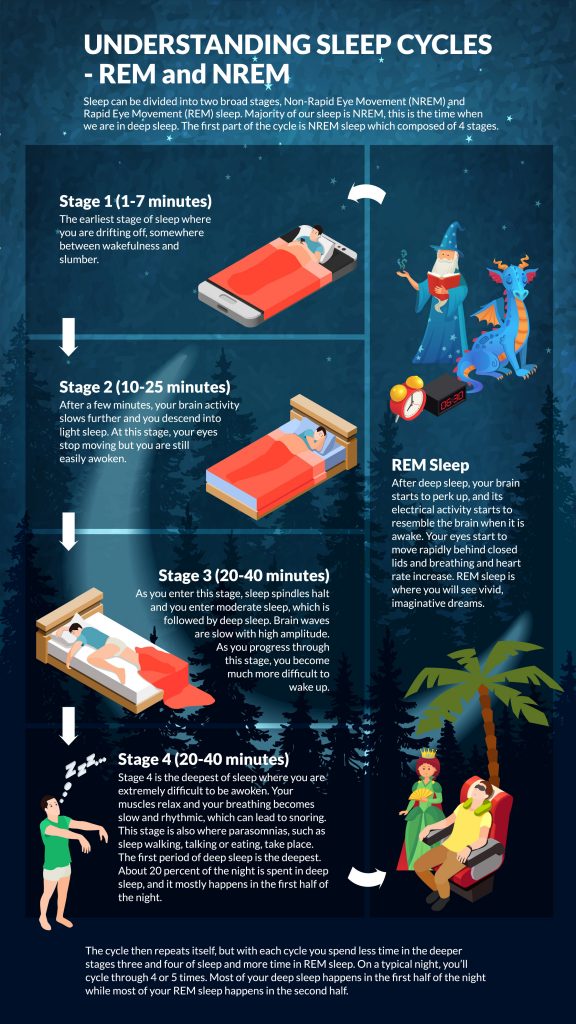
What is a sleep cycle? – Understanding REM and NREM Sleep
When you have a good night’s sleep, you wake up feeling energetic, refreshed and ready to start your day. Sleep affects not only your productivity at work but also your physical appearance. It can even impact your overall quality of life. Sleep can be divided into two broad stages, Non-Rapid Eye Movement (NREM) and Rapid Eye Movement (REM) sleep. Majority of our sleep is NREM, this is the time when we are in deep sleep. The first part of the cycle is NREM sleep which composed of 4 stages.
The Sleep Cycle Stages
Stage 1 (1-7 minutes):
The earliest stage of sleep where you are drifting off, somewhere between wakefulness and slumber. It is easy to get awoken as your brain is still quite active and you might even feel that you’ve not slept at all. Your eyes move slowly back and forth as your muscles relax. Your eyelids feel heavy and your head starts to drop. The electrical activity on an electroencephalogram (EEG) monitor starts to slow down, and the cortical waves become taller and spikier.
Stage 2 (10-25 minutes):
After a few minutes, your brain activity slows further and you descend into light sleep. Philip Gehrman, Ph.D., assistant professor of psychiatry at the University of Pennsylvania, dubs stage two sleep “average sleep” — It is not too deep, yet not too light. You become more detached and lose a sense of your surroundings, your heart rate and breathing regulate and body temperature drops. Your heart and vascular system are getting their much-needed rest and brain waves are slow with some rapid bursts known as ‘sleep spindles’. At this stage, your eyes stop moving but you are still easily awoken.

Stage 3 (20-40 minutes):
As you enter this stage, sleep spindles halt and you enter moderate sleep, which is followed by deep sleep. Brain waves are slow with high amplitude. These brain waves are known as delta waves. As you progress through this stage, you become much more difficult to wake up. According to the National Sleep Foundation, your blood pressure starts to drop, breathing slows down, blood flows to the muscles and tissue is repaired during this restorative stage of sleep. Hormones, such as the human growth hormone, are secreted at this time as well.
Stage 4 (20-40 minutes):
Stage 4 is the deepest of sleep where you are extremely difficult to be awoken. The EEG shows tall and slow waves, making jagged pattern on the EEG. Your muscles relax and your breathing becomes slow and rhythmic, which can lead to snoring. This stage is also where parasomnias, such as sleep walking, talking or eating, take place. The first period of deep sleep is the deepest. The sleeper awakened from deep sleep will probably feel groggy, confused or disoriented and might not be able to function for quite some time. About 20 percent of the night is spent in deep sleep, and it mostly happens in the first half of the night.
REM Sleep:
After deep sleep, your brain starts to perk up, and its electrical activity starts to resemble the brain when it is awake. Your eyes start to move rapidly behind closed lids and breathing and heart rate increase. REM sleep is where you will see vivid, imaginative dreams. At the same time, muscle groups become paralyzed to prevent you from acting out your dreams. The EEG shows low-amplitude, mixed frequency waves called theta waves, with some alpha waves.
The cycle then repeats itself, but with each cycle you spend less time in the deeper stages three and four of sleep and more time in REM sleep. On a typical night, you’ll cycle through four or five times. Most of your deep sleep happens in the first half of the night while most of your REM sleep happens in the second half.
Sources:
https://www.independent.co.uk/life-style/health-and-families/features/what-happens-to-your-body-when-you-sleep-a6675861.html
https://www.huffingtonpost.com/2014/03/07/your-body-does-incredible_n_4914577.html
https://www.hopkinsmedicine.org/health/healthy-sleep/sleep-science/the-science-of-sleep-understanding-what-happens-when-you-sleep
https://www.womansday.com/health-fitness/womens-health/advice/g1745/what-happens-during-sleep/





